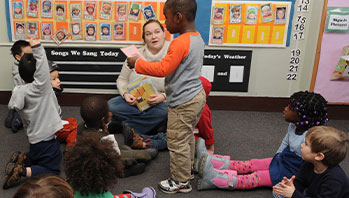- picture of a bike rider going down a steep hill
- down
- steep
MA Standards:
English Language Arts/Speaking and Listening/SL.PK.MA.2: Recall information for short periods of time and retell, act out, or represent information from a text read aloud, a recording, or a video (e.g., watch a video about birds and their habitats and make drawings or constructions of birds and their nests).English Language Arts/Foundational Skills/RF.PK.MA.2.c: Identify the initial sound of a spoken word and, with guidance and support, generate several other words that have the same initial sound.
Head Start Outcomes:
Literacy Knowledge/Alphabet Knowledge: Recognizes that the letters of the alphabet are a special category of visual graphics that can be individually named.Literacy Knowledge/Phonological Awareness: Identifies and discriminates between sounds and phonemes in language, such as attention to beginning and ending sounds of words and recognition that different words begin or end with the same sound.
PreK Learning Guidelines:
English Language Arts/Reading and Literature 7: Develop familiarity with the forms of alphabet letters, awareness of print, and letter forms. English Language Arts/Reading and Literature 8: Listen to, identify, and manipulate language sounds to develop auditory discrimination and phonemic awareness.
Word Play: Alliteration (/d/)

© Commonwealth of Massachusetts, Department of Early Education and Care (Jennifer Waddell photographer). All rights reserved.
ELA Focus Skills: Letter Recognition, Phonological Awareness, Word Recognition
Display a picture of a bicycle rider going down a steep hill. Elicit from children that the rider is going down the hill. Ask,
- What sound do you hear at the beginning of the word d-d-d-down? Emphasize that the word down begins with the /d/ sound.
Then explain to children that you will say more words and when they hear a word that begins with the /d/ sound, you want them to sit d-d-d-down.
- Then say other words that begin with the /d/ sound.
- Then have children listen to the sentence below. Say, Listen closely to the beginning sound of each word.
Ask, What did you notice about the beginning sound in each word? Repeat the sentence slowly, emphasizing the beginning /d/ sound. Prompt children to say the sentence with you.
- Then challenge them to repeat the tongue twister three times, faster and faster.
- Remind them that the faster you say a tongue twister, the more mixed up you can get!
Take It Further: Have groups of children make up more alliterative sentences of their own, with real or made-up words.
Adaptation: You may wish to have very young children simply say the alliterative sentence slowly with you and not do the tongue twisting, which might become frustrating for some.
English Language Learner: If children have difficulty understanding the tongue twister, use gestures and pictures to convey the concept as you say the words.
